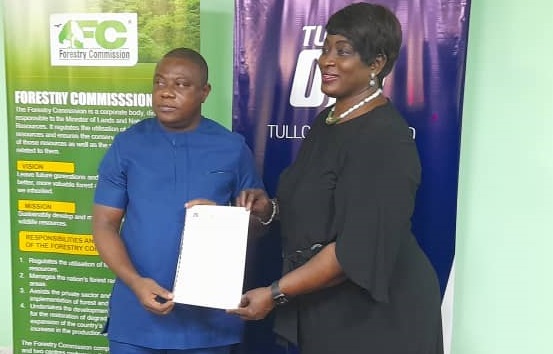John Allotey and Cynthia Lumor exchanging the signed agreements
TULLOW OIL has signed a Memorandum of Understanding (MOU) with Forestry Commission, to identify and develop carbon offset projects that will support both the realisation of Tullow’s 2030 Net Zero plans and the government’s Nationally Determined Contributions under the Paris Agreement.
Pursuant to the MOU signed, the two organisations will collaborate to develop projects which will enhance the conservation of existing forests and increase forest stocks in line with Ghana’s REDD+ strategy.
Chief Executive Officer of the Forestry Commission, John Allotey, in an address before the signing of the agreement, said this active collaboration will not only help build a low carbon future but will create alternative economic opportunities for communities within the identified project zones.
“We are happy having a private sector partnering the public institution to be able to work in areas that others will not venture and go into this particular study which is happening around the transitional zone of Ghana around Brekum and Kimtampo areas.
“We are going to have studies in that area to be able to determine the way forward in terms of improving the forest and also improving livelihoods which are very crucial into any interventions that are going to happen in those areas,” the Forestry Commission CEO said.
Mr. Allotey maintained that Ghana has demonstrated significant leadership on REDD+ to tackle deforestation and forest degradation.
“As a signatory to the Glasgow Leaders Declaration on Forests and Land-Use, the country is even more determined to harness the power of collective action, in partnership with private sector to make good our promise for the survival of forests ecosystems, people and their livelihoods,” he disclosed.
Deputy Managing Director of Tullow Ghana, Cynthia Lumor, in an address said the partnership with the Forestry Commission was to co-develop carbon offset projects.
“Benefits to local communities will be at the forefront of projects to be developed to ensure that we continue to create alternative livelihoods aligned with our shared prosperity agenda,” she said.
“As an oil and gas company, our products impact the environment. There is carbon emission even the use of oil, so what the company is doing is to reduce the carbon emissions that we actually do in the course of our work as well as the indirect ones that happened and not within our control,” she added.
BY Linda Tenyah-Ayettey

